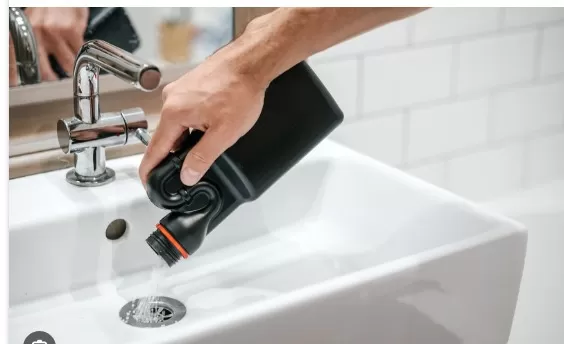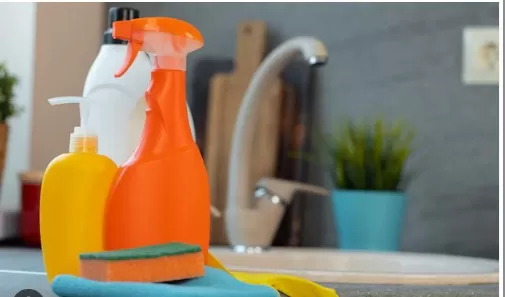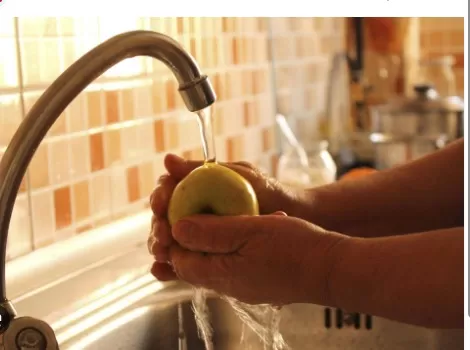Kitchen Sink Blunders: 5 Common Mistakes to Avoid. Let’s take a moment to reflect: How many of us have poured bacon grease or coffee grounds down the kitchen sink without a second thought? It’s a common practice, but it’s important to consider the consequences. What you dispose of today could potentially end up in your drinking water tomorrow.
The average American household consumes a staggering 300 gallons of water daily, and almost everything that goes down the sink eventually finds its way back into the water supply. However, modern water filtration systems are not always capable of fully eliminating toxic chemicals. This can lead to clogged pipes and costly plumbing issues. To avoid these problems and protect your water supply, it’s crucial to be mindful of what you pour down the sink. Take note of this list of substances that should never, under any circumstances, be dumped down the kitchen sink. By doing so, you’ll save yourself from potential dangers and unnecessary expenses.
Responsible Disposal of Pesticides and Fertilizers: Safeguarding the Environment and Public Health

Pesticides and fertilizers contain toxic substances that can have detrimental effects on ecosystems and pose serious health risks if mishandled.
The toxins present in pesticides can wreak havoc on fragile ecosystems, while the nitrates found in fertilizers can pose significant health hazards. For instance, nitrates can cause blue baby syndrome, a potentially fatal condition in infants where the blood is unable to transport oxygen properly.
It is crucial to handle the disposal of pesticides and fertilizers responsibly to protect the environment and public health.
Follow these steps for the proper disposal of pesticides and fertilizers:.
Contact Local Solid Waste Agency: To ensure the safe disposal of pesticides and fertilizers, get in touch with your local solid waste agency or environmental department.
They can provide guidance on the appropriate methods and facilities for disposing of these substances. Local regulations and guidelines may vary, so it is essential to follow the instructions provided by your specific municipality.
Hazardous Waste Collection Events: Many communities organize hazardous waste collection events where you can drop off pesticides and fertilizers for proper disposal.
These events often have designated collection points and trained personnel who can handle hazardous materials safely. Keep an eye out for such events in your area and take advantage of these opportunities to dispose of these substances responsibly.
Read Product Labels: When purchasing pesticides and fertilizers, carefully read the product labels for disposal instructions.
Some manufacturers provide specific guidelines on how to dispose of their products safely. Follow these instructions to ensure compliance with the recommended disposal methods.
Reduce Chemical Use: Minimizing the use of pesticides and fertilizers is an effective way to reduce the amount of hazardous waste generated.
Explore alternative, environmentally friendly pest control methods, such as integrated pest management (IPM) techniques or organic fertilizers, to limit the need for toxic substances.
Proper Storage: Prior to disposal, ensure that pesticides and fertilizers are stored securely and away from children, pets, and potential sources of water contamination.
Follow the storage instructions provided by the manufacturers to prevent accidental spills or leaks.
By disposing of pesticides and fertilizers responsibly, you contribute to the protection of the environment, the preservation of ecosystems, and the promotion of public health.
Avoid dumping these substances down the sink or draining them into the environment. Instead, rely on the expertise of local solid waste agencies and participate in designated collection events to ensure their safe and proper disposal.
Remember, it is important to stay informed about local regulations and guidelines regarding the disposal of hazardous waste.
By taking responsible actions, we can safeguard our environment for future generations and create a healthier and safer world.
Safe Disposal of Medications: Protecting the Environment and Public Health
It is common for many of us to accumulate a collection of various medications, including cold medicine, vitamins, and old prescriptions, in the back of our medicine cabinets.
However, when these medications expire or are no longer needed, it is crucial to avoid disposing of them in ways that could harm the environment or public health. Here are some responsible methods for medication disposal:.
Take-Back Programs: Many local pharmacies and healthcare facilities offer take-back programs for medications.
These programs provide a safe and convenient way to dispose of unused or expired medications. Check with your local pharmacy or healthcare provider to inquire about any take-back programs available in your area.
Mixing with Unwanted Substances: Another option for medication disposal is to mix the medications with undesirable substances, such as kitty litter or coffee grounds.
This helps to deter accidental ingestion and renders the medications less appealing. Once properly mixed, seal the mixture in a plastic bag and dispose of it in the regular household trash.
Follow FDA Guidelines: The U.
S. Food and Drug Administration (FDA) provides guidelines on medication disposal.
These guidelines may include specific instructions for certain medications or controlled substances. It is important to review the FDA recommendations and follow any specific instructions provided.
Do Not Flush or Drain: It is crucial to avoid disposing of medications by flushing them down the toilet or pouring them down the sink.
Studies have shown that this practice can result in the presence of pharmaceutical compounds in drinking water supplies, potentially harming aquatic life and affecting public health.
Remove Personal Information: Before disposing of any medication packaging, ensure that all personal information, such as your name and prescription details, is completely removed or obscured.
This helps protect your privacy and prevent the misuse of your personal information.
Proper disposal of medications is essential to prevent accidental ingestion, misuse, and environmental contamination.
By following these responsible disposal methods, you can contribute to the overall well-being of your community and the protection of the environment.
Remember, always check with local resources, such as pharmacies or healthcare providers, for information on medication take-back programs in your area.
If such programs are not available, follow the recommended guidelines for mixing medications with undesirable substances before throwing them in the regular trash. Let’s work together to ensure safe and environmentally friendly medication disposal practices.
Responsible Disposal of Household Chemicals: Protecting Your Home and the Environment

Numerous toxic substances are present in common household products, ranging from paints and paint thinners to solvents, cleaners, and polishes.
It is essential to handle the disposal of these chemicals responsibly to protect both your home and the environment. Instead of pouring them down the drain, there are alternative methods for disposing of these substances safely and effectively.
Community Cleanup Days: Many cities and towns organize community cleanup events where they accept toxic substances for proper disposal.
Take advantage of these opportunities to dispose of leftover paints, paint thinners, turpentine, solvent-based cleaners and polishes, lacquers, and even nail polish remover. These events often have designated collection points or facilities where you can drop off your household chemicals.
Household Hazardous Waste Collection Centers: Some areas have permanent or periodic household hazardous waste collection centers.
These centers are specifically designed to handle the safe disposal of toxic substances. Check with your local municipality or waste management authority to find out if such a facility exists in your area and to learn about their operating hours and accepted materials.
Contact Local Environmental Agencies: Reach out to local environmental agencies or waste management authorities for guidance on proper disposal methods for household chemicals.
They can provide you with information on specific disposal facilities, regulations, and any upcoming events or programs dedicated to the safe handling of these substances.
Reduce, Reuse, and Recycle: Before resorting to disposal, consider if there are any alternatives for reducing, reusing, or recycling household chemicals.
For example, some paint products can be donated to community organizations or used for touch-ups around the house. Look for recycling programs that accept certain chemicals or packaging materials for proper recycling.
Read Labels and Follow Instructions: When using household chemicals, always read the labels carefully and follow the instructions provided.
Some products may have specific recommendations for disposal or may require certain steps to render them safe for disposal.
By disposing of household chemicals responsibly, you help minimize the potential hazards they pose to the environment, human health, and sanitation systems.
Additionally, you contribute to the conservation of natural resources and reduce the risk of water and soil contamination.
Remember, it is crucial to avoid pouring household chemicals down the drain or discarding them with regular household waste.
Take advantage of community cleanup days, household hazardous waste collection centers, and local resources to ensure the safe and proper disposal of these substances. Let’s work together to create a cleaner and healthier environment for everyone.
Proper Disposal of Used Motor Oil: Protecting the Environment
Among the various substances that should never be poured down the sink, used motor oil stands out as a significant threat.
It is crucial to avoid disposing of used motor oil in this manner, as it can have severe consequences for the environment. Surprisingly, just one quart of used motor oil is capable of contaminating one million gallons of drinking water, as reported by the EPA. In addition to used motor oil, other automotive products like brake fluid, antifreeze, and engine degreaser should also be handled responsibly.
Proper disposal of used motor oil and other automotive products is essential to prevent environmental harm.
The following steps should be taken to ensure their safe disposal:.
Visit a Service Station: Many service stations accept used motor oil and other automotive products for proper disposal.
They have designated collection areas or tanks specifically designed for storing and recycling these substances. Check with your local service station to determine if they accept used motor oil and where it should be dropped off.
Utilize Recycling Centers: Recycling centers are another option for disposing of used motor oil and other automotive products safely.
These facilities specialize in the proper handling and recycling of hazardous materials. They have the necessary infrastructure to collect, process, and recycle these substances, reducing their impact on the environment.
Follow Local Regulations: It is crucial to familiarize yourself with local regulations regarding the disposal of used motor oil.
Some municipalities have specific guidelines and designated collection points for hazardous waste. These regulations may vary, so it is essential to comply with the rules and regulations set by your local authorities.
Use Oil Recycling Programs: In some regions, there are oil recycling programs available that facilitate the proper disposal of used motor oil.
These programs often include collection points at recycling centers or designated drop-off locations. Check with local environmental organizations or government agencies to find information about these programs in your area.
Proper disposal of used motor oil and other automotive products is not only important for safeguarding the environment but also for preventing harm to human health.
By taking the necessary steps to dispose of these substances responsibly, you contribute to the conservation of Clean Water sources and the protection of ecosystems.
Remember, used motor oil and other automotive products should never be poured down the sink or disposed of in regular household waste.
Instead, opt for recycling centers, service stations, or designated collection programs to ensure their safe and environmentally friendly disposal. Let’s work together to preserve our environment for future generations.
The Perils of Drains: Are You Guilty of These Common Offenses?

Many of us view the drain in our kitchen sink as a quick and convenient solution for getting rid of household waste and garbage.
However, it’s important to remember that not everything can safely go down the drain. In this article, we highlight some of the most common mistakes people make when it comes to disposing of items down the drain.
Take a look and see if you’re guilty of any of these offenses.
Pouring Grease and Oils: One of the most common mistakes is pouring grease and oils down the drain.
While they may be in liquid form when hot, these substances solidify as they cool and can cause blockages in your pipes over time.
Flushing Non-Biodegradable Items: Flushing non-biodegradable items, such as wet wipes, tampons, or cotton balls, down the toilet can lead to clogs and sewage backups.
These items don’t break down easily and can cause serious damage to your plumbing system.
Disposing of Food Scraps: Although it may seem convenient to rinse food scraps down the drain, larger pieces can get stuck in the pipes and cause blockages.
Instead, consider using a compost bin or garbage disposal unit specifically designed for food waste.
Dumping Harsh Chemicals: Harsh chemicals like paint thinner, bleach, or drain cleaners can corrode your pipes and harm the environment when flushed down the drain.
It’s important to dispose of these chemicals properly according to local regulations.
Allowing Hair to Accumulate: Hair is one of the main culprits behind clogged drains.
Regularly cleaning hair from your drains using a drain trap or mesh screen can prevent blockages and costly repairs.
Neglecting Regular Maintenance: Failing to maintain your drains can lead to serious problems down the line.
Regularly inspecting and cleaning your drains can help identify any issues before they escalate into major plumbing emergencies.
By avoiding these common mistakes and being mindful of what goes down your drains, you can prevent blockages, protect your plumbing system, and contribute to a healthier environment.
Remember, when in doubt, it’s always better to dispose of items in the appropriate manner rather than risking potential damage to your drains.
*The information is for reference only.